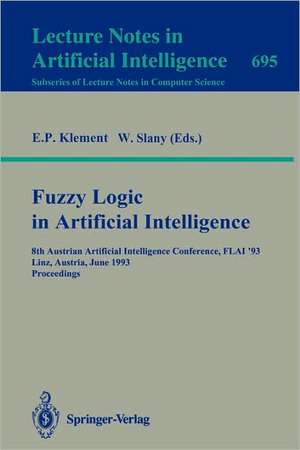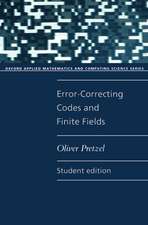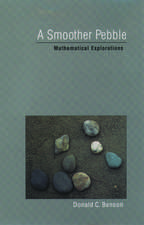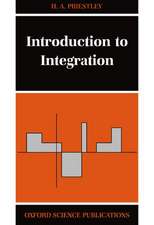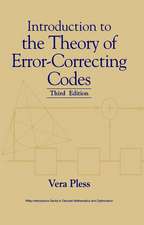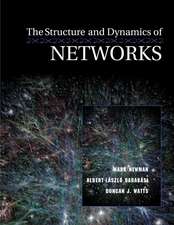Fuzzy Logic in Artificial Intelligence: 8th Austrian Artificial Intelligence Conference, FLAI'93, Linz, Austria, June 28-30, 1993. Proceedings: Lecture Notes in Computer Science, cartea 695
Editat de Erich P. Klement, Wolfgang Slanyen Limba Engleză Paperback – 16 iun 1993
Din seria Lecture Notes in Computer Science
- 20%
 Preț: 1061.55 lei
Preț: 1061.55 lei - 20%
 Preț: 307.71 lei
Preț: 307.71 lei - 20%
 Preț: 438.69 lei
Preț: 438.69 lei - 20%
 Preț: 579.30 lei
Preț: 579.30 lei -
 Preț: 410.88 lei
Preț: 410.88 lei - 17%
 Preț: 427.22 lei
Preț: 427.22 lei - 20%
 Preț: 596.46 lei
Preț: 596.46 lei - 15%
 Preț: 448.04 lei
Preț: 448.04 lei - 20%
 Preț: 353.50 lei
Preț: 353.50 lei -
 Preț: 389.49 lei
Preț: 389.49 lei - 20%
 Preț: 309.90 lei
Preț: 309.90 lei - 20%
 Preț: 645.28 lei
Preț: 645.28 lei - 20%
 Preț: 763.23 lei
Preț: 763.23 lei - 15%
 Preț: 580.46 lei
Preț: 580.46 lei - 20%
 Preț: 310.28 lei
Preț: 310.28 lei - 20%
 Preț: 655.02 lei
Preț: 655.02 lei - 20%
 Preț: 1183.14 lei
Preț: 1183.14 lei - 20%
 Preț: 340.32 lei
Preț: 340.32 lei -
 Preț: 449.57 lei
Preț: 449.57 lei - 20%
 Preț: 591.51 lei
Preț: 591.51 lei - 18%
 Preț: 938.83 lei
Preț: 938.83 lei - 20%
 Preț: 337.00 lei
Preț: 337.00 lei - 20%
 Preț: 649.50 lei
Preț: 649.50 lei - 20%
 Preț: 607.40 lei
Preț: 607.40 lei - 20%
 Preț: 1414.79 lei
Preț: 1414.79 lei - 20%
 Preț: 1024.44 lei
Preț: 1024.44 lei - 20%
 Preț: 583.40 lei
Preț: 583.40 lei - 20%
 Preț: 453.32 lei
Preț: 453.32 lei - 20%
 Preț: 575.49 lei
Preț: 575.49 lei - 20%
 Preț: 1075.26 lei
Preț: 1075.26 lei - 20%
 Preț: 585.88 lei
Preț: 585.88 lei - 20%
 Preț: 825.93 lei
Preț: 825.93 lei - 17%
 Preț: 360.20 lei
Preț: 360.20 lei - 20%
 Preț: 763.23 lei
Preț: 763.23 lei - 20%
 Preț: 340.32 lei
Preț: 340.32 lei - 20%
 Preț: 504.58 lei
Preț: 504.58 lei - 20%
 Preț: 369.13 lei
Preț: 369.13 lei - 20%
 Preț: 580.93 lei
Preț: 580.93 lei - 20%
 Preț: 343.62 lei
Preț: 343.62 lei - 20%
 Preț: 350.21 lei
Preț: 350.21 lei - 20%
 Preț: 583.40 lei
Preț: 583.40 lei - 20%
 Preț: 583.40 lei
Preț: 583.40 lei - 15%
 Preț: 438.59 lei
Preț: 438.59 lei - 20%
 Preț: 341.95 lei
Preț: 341.95 lei - 20%
 Preț: 238.01 lei
Preț: 238.01 lei - 20%
 Preț: 538.30 lei
Preț: 538.30 lei
Preț: 227.45 lei
Preț vechi: 284.31 lei
-20% Nou
Puncte Express: 341
Preț estimativ în valută:
43.53€ • 47.26$ • 36.56£
43.53€ • 47.26$ • 36.56£
Carte tipărită la comandă
Livrare economică 22 aprilie-06 mai
Preluare comenzi: 021 569.72.76
Specificații
ISBN-13: 9783540569206
ISBN-10: 3540569200
Pagini: 212
Ilustrații: VIII, 200 p.
Dimensiuni: 216 x 279 x 11 mm
Greutate: 0.31 kg
Ediția:1993
Editura: Springer Berlin, Heidelberg
Colecția Springer
Seriile Lecture Notes in Computer Science, Lecture Notes in Artificial Intelligence
Locul publicării:Berlin, Heidelberg, Germany
ISBN-10: 3540569200
Pagini: 212
Ilustrații: VIII, 200 p.
Dimensiuni: 216 x 279 x 11 mm
Greutate: 0.31 kg
Ediția:1993
Editura: Springer Berlin, Heidelberg
Colecția Springer
Seriile Lecture Notes in Computer Science, Lecture Notes in Artificial Intelligence
Locul publicării:Berlin, Heidelberg, Germany
Public țintă
ResearchCuprins
The role of fuzzy logic and soft computing in the conception and design of intelligent systems.- A contextual approach for AI systems development.- Typicality of concept instances: a semiotic way for its evaluation.- Non-conventional conjunctions and implications in fuzzy logic.- A comparative fuzzy modal logic.- Combining neural networks and fuzzy controllers.- A reinforcement learning algorithm based on ‘safety’.- GAITS: Fuzzy sets-based algorithms for computing strategies using genetic algorithms.- Neural networks and genetic algorithm approaches to auto-design of fuzzy systems.- Symbolic and numeric data management in a geographical information system: A fuzzy neural network approach.- Approximate reasoning in the modeling of consensus in group decisions.- Fuzzy logic-based processing of expert rules used for checking the creditability of small business firms.- Fuzzy control in real-time for vision guided autonomous mobile robots.- Robot Motion Coordination by Fuzzy control.- Fuzzy control schemes for active magnetic bearings.- An adaptive fuzzy control module for automatic dialysis.- A combination scheme of artificial intelligence and fuzzy pattern recognition in medical diagnosis.- Fuzzy concepts for predicting the behaviour of other drivers on a highway.- Design of a fuzzy car distance controller.- Karl Menger fuzzy logic and artificial intelligence — An experiment in reflection.- Workshop for doctoral students in fuzzy-based systems.- Industrial and commercial applications of fuzzy logic.- Fuzzy scheduling systems.
